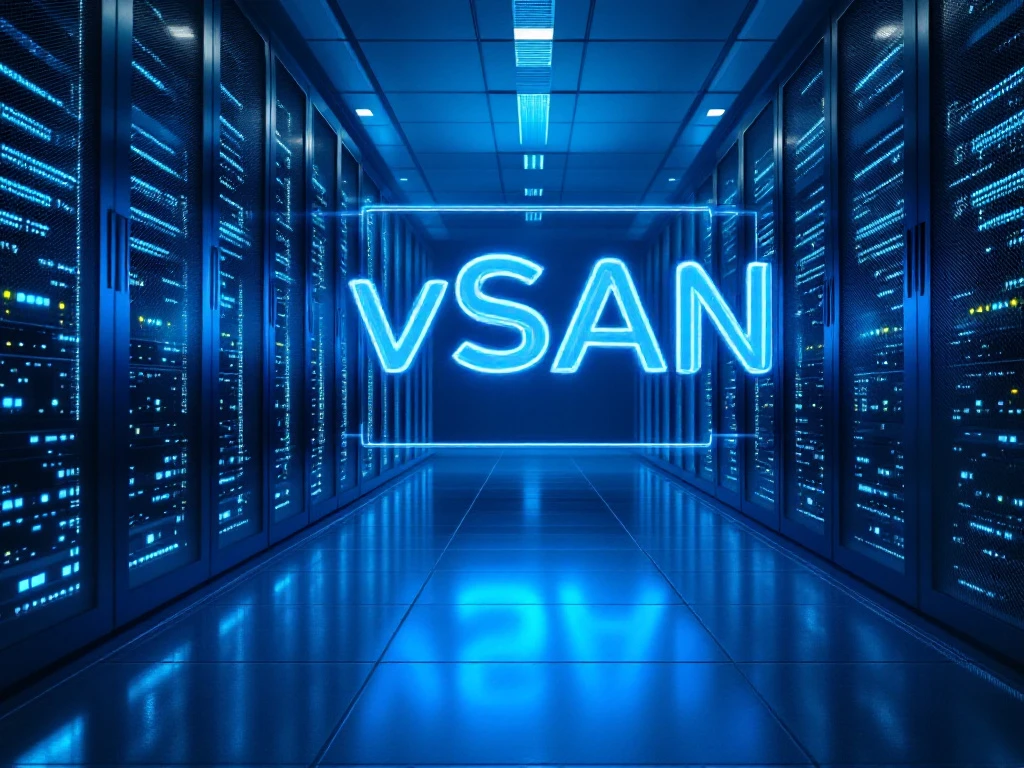What is VMware vSAN and how does it compare to traditional storage?

Introduction to VMware vSAN
VMware vSAN is a cutting-edge software-defined storage solution that plays a crucial role in modern data centers. As part of VMware's robust ecosystem, it transforms local storage resources into a shared datastore that integrates seamlessly with existing VMware environments. This innovative technology is designed to enhance storage efficiency and flexibility, catering to the demanding needs of today's digital landscape.
By leveraging VMware vSAN, businesses can optimize their IT infrastructure, allowing for streamlined management and improved resource allocation. This solution is particularly beneficial for organizations looking to reduce costs while maintaining high performance and scalability. As data centers continue to evolve, VMware vSAN stands out as a pivotal component for achieving these objectives.
At Falconcloud, we understand the importance of reliable and scalable storage solutions. Our VMware cloud offerings integrate seamlessly with vSAN, providing a comprehensive platform for businesses to deploy and manage their IT infrastructure effectively. By partnering with us, you can leverage the full potential of VMware vSAN to support your business goals.
How does VMware vSAN work?
VMware vSAN operates by pooling together local storage from a cluster of hosts to create a shared datastore. This innovative approach to storage architecture allows businesses to utilize existing hardware resources, significantly reducing the need for expensive, dedicated storage systems. The technology is engineered to work seamlessly within the VMware ecosystem, making it an ideal choice for organizations already using VMware solutions.
The architecture of VMware vSAN includes several key components such as disk groups, which consist of a cache tier and a capacity tier. The cache tier uses high-performance SSDs to accelerate read and write operations, while the capacity tier provides persistent storage using traditional hard disks or SSDs. This combination enhances overall storage performance and reliability, catering to diverse workload requirements.
Falconcloud's expertise in deploying VMware vSAN ensures that our clients can take full advantage of this technology. By utilizing our Virtual Private Cloud services, you can achieve a seamless integration of vSAN into your existing infrastructure, enhancing both performance and scalability.
What are the advantages of VMware vSAN over traditional storage?
One of the most significant advantages of VMware vSAN over traditional storage solutions is its cost efficiency. By utilizing existing hardware resources, businesses can minimize the need for expensive dedicated storage systems. Additionally, vSAN's software-defined nature allows for easy scalability, enabling organizations to expand their storage capacity as needed without significant upfront investment.
Ease of management is another key benefit of VMware vSAN. With its integration into the VMware ecosystem, administrators can manage their storage resources through familiar VMware tools and interfaces. This streamlined management process reduces complexity and allows for more efficient use of IT staff resources.
Furthermore, VMware vSAN offers enhanced performance capabilities, thanks to its use of high-performance SSDs in the cache tier. This feature accelerates read and write operations, ensuring that businesses can meet the demands of modern workloads. At Falconcloud, our VMware solutions are designed to help you harness these benefits, empowering your organization with a robust and flexible storage infrastructure.
What are the limitations of VMware vSAN?
Despite its numerous advantages, VMware vSAN does have some limitations that organizations should consider. One potential drawback is the hardware requirements necessary for optimal performance. To fully leverage vSAN's capabilities, businesses may need to invest in high-performance SSDs and compatible hardware, which can increase initial setup costs.
Performance issues can also arise if the vSAN cluster is not properly configured or if there is a lack of sufficient resources. Ensuring that the cache and capacity tiers are appropriately balanced is crucial for maintaining optimal performance and avoiding bottlenecks in the storage infrastructure.
Additionally, while VMware vSAN integrates seamlessly with VMware environments, it may not offer the same level of functionality as some traditional storage solutions. Organizations with specific storage needs or legacy systems may encounter limitations when adopting vSAN. At Falconcloud, we work closely with our clients to assess their unique requirements and recommend the most suitable storage solutions.
How does VMware vSAN fit into hyper-converged infrastructure?
VMware vSAN is a key component of hyper-converged infrastructure (HCI), which combines compute, storage, and networking resources into a single, integrated solution. This approach simplifies data center management and enhances resource utilization, making it an attractive option for businesses looking to modernize their IT infrastructure.
By integrating storage directly into the hypervisor, VMware vSAN eliminates the need for separate storage systems, reducing complexity and cost. This streamlined architecture allows organizations to manage their entire IT environment through a single interface, improving operational efficiency and reducing the risk of errors.
Falconcloud's expertise in VMware vSAN and HCI solutions ensures that our clients can fully harness the benefits of this integrated approach. By partnering with us, you can simplify your data center management and optimize your resource utilization, driving greater value from your IT investments.
Comparative analysis: VMware vSAN vs traditional storage
When comparing VMware vSAN to traditional storage solutions, several key differences emerge. In terms of performance, vSAN's use of high-performance SSDs in the cache tier offers significant advantages over traditional storage systems, which may rely on slower, spinning disks.
Cost efficiency is another area where VMware vSAN excels. By leveraging existing hardware resources, businesses can reduce the need for costly dedicated storage systems. In contrast, traditional storage solutions often require significant upfront investment in specialized hardware.
Scalability is also a major benefit of VMware vSAN. Its software-defined nature allows organizations to easily expand their storage capacity as needed, while traditional storage systems may require additional hardware purchases and complex reconfigurations. At Falconcloud, we help our clients navigate these differences, ensuring they choose the most suitable storage solution for their business needs.
Conclusion and future outlook
In conclusion, VMware vSAN offers numerous advantages over traditional storage solutions, including cost efficiency, scalability, and ease of management. However, it is important to consider potential limitations such as hardware requirements and performance considerations when adopting this technology.
As the landscape of storage solutions continues to evolve, VMware vSAN is poised to play a significant role in the future of data center management. With its ability to integrate seamlessly into hyper-converged infrastructure, vSAN provides a flexible and efficient storage solution for modern businesses.
At Falconcloud, we are committed to empowering our clients with cutting-edge storage solutions that meet the demands of today's digital world. By partnering with us, you can leverage the full potential of VMware vSAN and other innovative technologies to drive your business forward.



